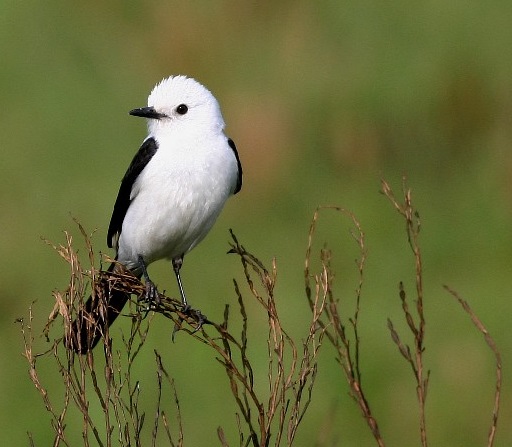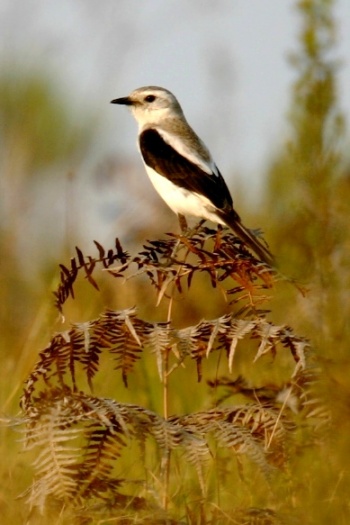(User template. Attempt to clean-up copied text.) |
(Photos dated. Reference updated) |
||
| Line 1: | Line 1: | ||
;[[: Category:Xolmis|Xolmis]] dominicanus | ;[[: Category:Xolmis|Xolmis]] dominicanus | ||
| − | [[Image:Black-and-white_Monjita_male_by_Jamfaraco.jpg|thumb|550px|right|Photo of a male by {{user|Jamfaraco|Jamfaraco}}<br />Photographed at Lages/SC, [[Brazil]] | + | [[Image:Black-and-white_Monjita_male_by_Jamfaraco.jpg|thumb|550px|right|Photo of a male by {{user|Jamfaraco|Jamfaraco}}<br />Photographed at Lages/SC, [[Brazil]], October 2006]] |
| − | |||
==Identification== | ==Identification== | ||
*20.5 cm.<br /> | *20.5 cm.<br /> | ||
| Line 11: | Line 10: | ||
*Crown, back of neck and back are a brownish-grey | *Crown, back of neck and back are a brownish-grey | ||
==Distribution== | ==Distribution== | ||
| − | + | South-eastern [[Brazil]] (Paraná) to [[Paraguay]], [[Uruguay]] and north-east [[Argentina]] | |
| − | [[Brazil]] | ||
==Taxonomy== | ==Taxonomy== | ||
This is a monotypic species<sup>[[#References|1]]</sup>. | This is a monotypic species<sup>[[#References|1]]</sup>. | ||
| Line 18: | Line 16: | ||
In the past, this species was placed in the genus ''[[: Category:Heteroxolmis|Heteroxolmis]]''. The second part of the scientific name has also recently been changed, from ''dominicana'' to ''dominicanus''. | In the past, this species was placed in the genus ''[[: Category:Heteroxolmis|Heteroxolmis]]''. The second part of the scientific name has also recently been changed, from ''dominicana'' to ''dominicanus''. | ||
==Habitat== | ==Habitat== | ||
| + | [[Image:Black_and_White_Monjita.jpg|thumb|350px|right|Photo of female by {{user|Jamfaraco|Jamfaraco}}<br />Photographed at Lages/SC, [[Brazil]], September 2004]] | ||
Open areas, fields and humid fields, dry lowland grassland, seasonally wet or flooded lowland grassland, arable land, and pastureland. | Open areas, fields and humid fields, dry lowland grassland, seasonally wet or flooded lowland grassland, arable land, and pastureland. | ||
| − | |||
==Behaviour== | ==Behaviour== | ||
| Line 25: | Line 23: | ||
Mostly silent. Occasionally delivers soft calls. | Mostly silent. Occasionally delivers soft calls. | ||
==References== | ==References== | ||
| − | BirdLife International | + | #{{Ref-Clements6thDec08}}#BirdLife International |
| − | + | {{ref}} | |
| − | |||
| − | |||
==External Links== | ==External Links== | ||
{{GSearch|Xolmis+dominican}} | {{GSearch|Xolmis+dominican}} | ||
[[Category:Birds]][[Category:Xolmis]] | [[Category:Birds]][[Category:Xolmis]] | ||
Revision as of 22:47, 5 December 2009
- Xolmis dominicanus
Identification
- 20.5 cm.
Male -
- White body
- Black wings and tail
- White wing-tips particularly noticeable in flight
Female - similar
- Crown, back of neck and back are a brownish-grey
Distribution
South-eastern Brazil (Paraná) to Paraguay, Uruguay and north-east Argentina
Taxonomy
This is a monotypic species1.
In the past, this species was placed in the genus Heteroxolmis. The second part of the scientific name has also recently been changed, from dominicana to dominicanus.
Habitat
Open areas, fields and humid fields, dry lowland grassland, seasonally wet or flooded lowland grassland, arable land, and pastureland.
Behaviour
Vocalisation
Mostly silent. Occasionally delivers soft calls.
References
- Clements, JF. 2008. The Clements Checklist of Birds of the World. 6th ed., with updates to December 2008. Ithaca: Cornell Univ. Press. ISBN 978-0801445019.
- BirdLife International
Recommended Citation
- BirdForum Opus contributors. (2024) Black-and-white Monjita. In: BirdForum, the forum for wild birds and birding. Retrieved 24 April 2024 from https://www.birdforum.net/opus/Black-and-white_Monjita





